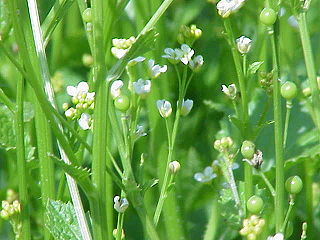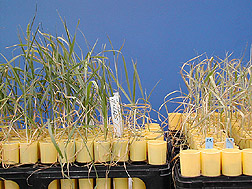
The oat, sometimes called the common oat, is a species of cereal grain grown for its seed, which is known by the same name. Oats appear to have been domesticated as a secondary crop, as their seeds resembled those of other cereals closely enough for them to be included by early cultivators. Oats tolerate cold winters less well than cereals such as wheat, barley, and rye, but need less summer heat and more rain, making them important in areas such as Northwest Europe that have cool wet summers. They can tolerate low-nutrient and acid soils. Oats grow thickly and vigorously, allowing them to outcompete many weeds, and compared to other cereals are relatively free from diseases.

Pearl millet is the most widely grown type of millet. It has been grown in Africa and the Indian subcontinent since prehistoric times. The center of diversity, and suggested area of domestication, for the crop is in the Sahel zone of West Africa. Recent archaeobotanical research has confirmed the presence of domesticated pearl millet on the Sahel zone of northern Mali between 2500 and 2000 BC. 2023 was the International Year of Millets, declared by the United Nations General Assembly in 2021.

The International Crops Research Institute for the Semi-Arid Tropics (ICRISAT) is an international organisation which conducts agricultural research for rural development, headquartered in Patancheru, Hyderabad, Telangana, India, with several regional centres and research stations . It was founded in 1972 by a consortium of organisations convened by the Ford- and the Rockefeller- foundations. Its charter was signed by the FAO and the UNDP.

Groats are the hulled kernels of various cereal grains, such as oats, wheat, rye, and barley. Groats are whole grains that include the cereal germ and fiber-rich bran portion of the grain, as well as the endosperm.

Uncle Tobys is an Australian food manufacturing company which specialises in breakfast oat products. Since its foundation in 1861, the company has expanded its product range across the cereal and ready-to-eat snack market. Uncle Tobys is currently operated as a wholly owned subsidiary of Nestlé, after being acquired in 2006. Uncle Tobys’ main factory is situated in the town of Wahgunyah, Victoria.
Animal breeding is a branch of animal science that addresses the evaluation of the genetic value of livestock. Selecting for breeding animals with superior EBV in growth rate, egg, meat, milk, or wool production, or with other desirable traits has revolutionized livestock production throughout the entire world. The scientific theory of animal breeding incorporates population genetics, quantitative genetics, statistics, and recently molecular genetics and is based on the pioneering work of Sewall Wright, Jay Lush, and Charles Henderson.

Crambe abyssinica is an annual oilseed crop of the family Brassicaceae. It is mainly cultivated due to the high levels of erucic acid that are contained in its seeds. The crambe oil is used for industrial purposes and its side products can be partly used as animal feed.
In molecular biology and other fields, a molecular marker is a molecule, sampled from some source, that gives information about its source. For example, DNA is a molecular marker that gives information about the organism from which it was taken. For another example, some proteins can be molecular markers of Alzheimer's disease in a person from which they are taken. Molecular markers may be non-biological. Non-biological markers are often used in environmental studies.

Romania has an agricultural capacity of approximately 14.7 million hectares (57,000 sq mi) 9.38 million are used as arable land. In 2008, an evaluation revealed that 6.8 million hectares are not used. In 2018, Romania was the third biggest agricultural producer of the EU and produced the largest amount of maize.
The Institute of Plant Breeding (IPB) is a research institute of the University of the Philippines Los Baños. It is the national biotechnology research center and repository for all crops other than rice, which is handled by the Philippine Rice Research Institute.

Plant breeding is the science of changing the traits of plants in order to produce desired characteristics. It is used to improve the quality of plant products for use by humans and animals. The goals of plant breeding are to produce crop varieties that boast unique and superior traits for a variety of applications. The most frequently addressed agricultural traits are those related to biotic and abiotic stress tolerance, grain or biomass yield, end-use quality characteristics such as taste or the concentrations of specific biological molecules and ease of processing.

Rajeev Kumar Varshney is an Indian agricultural scientist, specializing in genomics, genetics, molecular breeding and capacity building in developing countries. Varshney is currently serving as Director, Western Australian State Agricultural Biotechnology Center; Director, Centre for Crop & Food Innovation; and International Chair in Agriculture & Food Security with the Food Futures Institute at Murdoch University, Australia since Feb 2022. Before joining Murdoch University, Australia he served International Crops Research Institute for the Semi-Arid Tropics (ICRISAT), a global agriculture R&D institute, for more than 16 years in different scientific and research leadership roles including Research Program Director for three global research programs– Grain Legumes, Genetic Gains and Accelerated Crop Improvement Program. He has the onus of establishing and nurturing the Center of Excellence in Genomics & Systems Biology (CEGSB), a globally recognized center for genomics research at ICRISAT that made impacts on improving agriculture and development of human resources in several countries including India, China, Kenya, Ethiopia, Tanzania, Nigeria, Ghana, Mali, Senegal, Burkina Faso, etc. Varshney holds Adjunct/Honorary/Visiting Professor positions at 10 academic institutions in Australia, China, Ghana, Hong Kong and India, including The University of Western Australia, University of Queensland, West Africa Centre for Crop Improvement, University of Hyderabad, Chaudhary Charan Singh University and Professor Jayashankar Telangana State Agricultural University.
Molecular breeding is the application of molecular biology tools, often in plant breeding and animal breeding. In the broad sense, molecular breeding can be defined as the use of genetic manipulation performed at the level of DNA to improve traits of interest in plants and animals, and it may also include genetic engineering or gene manipulation, molecular marker-assisted selection, and genomic selection. More often, however, molecular breeding implies molecular marker-assisted breeding (MAB) and is defined as the application of molecular biotechnologies, specifically molecular markers, in combination with linkage maps and genomics, to alter and improve plant or animal traits on the basis of genotypic assays.

The Quaker Oats Company, known as Quaker, is an American food conglomerate based in Chicago, Illinois. As Quaker Mill Company, the company was founded in 1877 in Ravenna, Ohio. In 1881, Henry Crowell bought the company and launched a national advertising campaign for Quaker Oats.
The Germplasm Resources Unit is part of the John Innes Centre. Located in the Norwich Research Park, Norwich, England, is a germplasm conservation unit and National Capability supported by the Biotechnology and Biological Sciences Research Council. This unit houses a number of internationally recognised reference- and working-collections for wheat, oats, barley and peas, which serves UK and non-UK based academic, industrial and non-industrial groups.
Vernon Douglas Burrows was a research scientist at Agriculture and Agri-Food Canada (AAFC) and an international authority on oat breeding and utilization. He bred and registered 28 varieties of oats, including AC Gehl, the “naked oat,” which is hulless and hairless and therefore easier to process and transport. In 2001 Burrows was appointed as Member of the Order of Canada, and in 2018 he was promoted to Officer of the Order of Canada for his research that has enhanced the production and nutritional value of oat-based foods.
For the American folk singer and songwriter, see Nancy Ames.
Avena byzantina, red oats, is a species of cultivated oat native to Greece, Turkey, Cyprus, the Transcaucasus, Iran, and Saudi Arabia. Cultivated for thousands of years, it is better suited to warmer conditions than white or common oats, but is often sown as a no‑till winter crop. There are 564 landraces and 203 cultivars of red oats listed in the European Plant Genetic Resources Search Catalogue (EURISCO). Approximately 10% of the millions of hectares worldwide under oats are devoted to red oats, principally for fodder.
Jennifer Mitchell Fetch is a Canadian research scientist with Agriculture and Agri-Food Canada (AAFC) with expertise in oat breeding. She is known for running the only organic oat breeding program in Canada and helping with the development of several oat milling quality cultivars, including the first organically developed cultivar, AAC Oravena. Canada is the largest exporter of oats in the world, emphasizing the importance of developing new and improved cultivars for farmers. Canada is responsible for producing approximately 3 million tonnes of quality oats every year, with 90% being from Western Canada, where Mitchell Fetch focused her research and was the only Agriculture Canada oat breeder for years. Mitchell Fetch was employed by AAFC in 1998 and spent 22 years as an oat breeder before her retirement in 2020.
Ralph Merrill Caldwell was an American plant breeder, mycologist, and plant pathologist. Through his work with the U.S. Department of Agriculture and Purdue University, he developed disease-resistant cultivars for a wide variety of plants, including widely-grown wheat cultivars.









